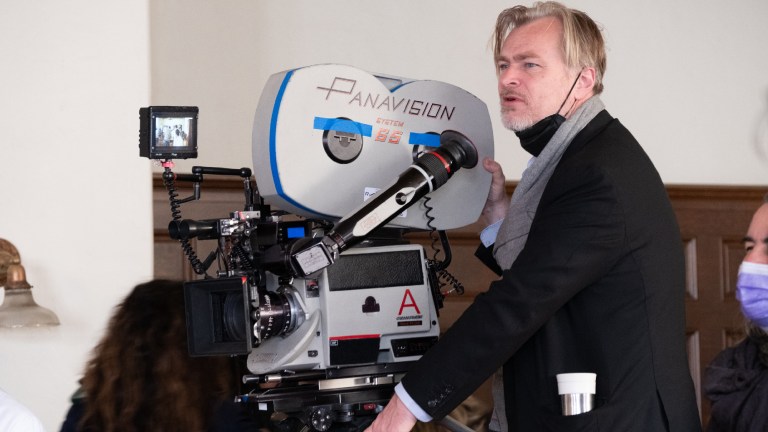Should Christopher Nolan Finally Make a James Bond Movie?
The Oppenheimer director has praised 007 for years. Is it time to see what he can do?

Christopher Nolan has made no secret of his love for the James Bond franchise over the years, telling Playboy in 2017 that “I deeply love the character.” That affection for 007 is evident in a lot of Nolan’s filmography as well, from the climactic action scenes of Inception to many of the narrative tropes of Tenet (minus of course the traveling backward in time). It even connects to the supervillains and gadgets of his Dark Knight films, which share a certain DNA with the Bond canon.
Nolan admitted to the heavy influence of the Bond films—particularly the ones he grew up on, with Sean Connery, George Lazenby, and Roger Moore all playing the character—during Inception’s premiere in 2010. At the time, he told Empire, “I’ve been plundering ruthlessly from the Bond movies in everything I’ve done, forever. They’re a huge influence on me.” He’s also noted that their “grand scale action” was an inspiration for the kind of large-canvas movies he’s made for most of his career.
Nevertheless, Nolan has so far resisted the urge to get into business with Eon Productions, the production company that has produced all 25 official Bond movies since 1962. Yet he doesn’t seem averse to the idea. In a recent interview with the Happy Sad Confused podcast to promote his new film Oppenheimer, the director made headlines by saying it would be “an amazing privilege” to steer a 007 adventure—with caveats, of course.
Nolan is, right now, perhaps riding the highest in terms of professional and public acclaim since he made The Dark Knight in 2008. Against seemingly all conventional wisdom, Oppenheimer—a three-hour, R-rated, largely talky, nonlinear period piece—is a massive hit. It’s been helped for sure by the Barbenheimer phenomenon, but the movie still clearly charting its own path within this extraordinary pop culture moment. Nolan has always made pretty much the movies he’s wanted since Batman Begins in 2005, but the success of Oppenheimer will no doubt bring him even more creative leverage than ever before.
The question is: Should he take that leverage and use it to make whatever strikes his interest next (as he’s mostly done all along) or enter the franchise fray once again by making the James Bond movie of his dreams?
Where Bond Stands
The 007 series itself is at a creative crossroads. The 15-year, five-picture run of Daniel Craig as the character was notable for three things: its consistency of tone that brought a more serious, emotionally vulnerable Bond to the screen, its telling of what was mostly a single story over the course of five movies, and the decision to kill off Bond at the end of the final film, 2021’s No Time to Die, leaving no doubt that the Daniel Craig era was over.
Ever since No Time to Die ended its theatrical run—and even before that, once it was known that this would be Craig’s swan song—the speculation has swirled around who will take the role next, how the producers will proceed following Bond’s death, and whether the character and series will undergo a radical reinvention or stick to a variation on the series’ traditional template (which even the Craig movies did to a certain degree). The Bond canon is so iconic in many ways that it would seem like almost too much of a risk to make extreme changes to the character, and reports that Aaron Taylor-Johnson, a white British actor in his mid-30s, was apparently the frontrunner for the role for at least a short period (that may have changed by now) indicate Eon Productions is thinking along the same lines.
There’s no doubt, however, that Bond needs a shake-up of some kind. After hitting a box office peak with Skyfall in 2012—the only Bond film to make more than a billion dollars—both 2015’s Spectre and No Time to Die didn’t quite hit those same heights. Both did well, to be sure, and No Time to Die performed admirably despite coming out after a long delay and at the tail end of the COVID pandemic.
The trick is for Eon producers Barbara Broccoli and Michael G. Wilson to figure out a way to bring a new generation of fans to Bond while not alienating the existing fanbase by making the character unrecognizable to them. Add to this the fact that all legacy franchises at the moment—from Marvel to DC to Transformers to Fast and Furious to even the American equivalent of 007, the Mission: Impossible series—have all underperformed at the box office this year. But that seeming upheaval in IP moviemaking also would seem to invite opportunity. So let’s give some serious consideration as to whether Nolan might be able to help reboot Bond like he did Batman a few decades ago…
Nolan Directing 007: The Pros
Let’s say that Christopher Nolan is approached by Eon with a firm offer to direct Bond 26. What exactly would he bring to the table? Well, for one thing, instant publicity. While well-known directors like Sam Mendes and Cary Joji Fukunaga have helmed the last few Bond entries, Nolan would undoubtedly be the biggest name to step behind the camera for a 007 film, especially coming after all the attention focused on Oppenheimer. This is a series that, after all, has relied largely on journeyman directors-for-hire, and even parted ways with Danny Boyle in the early stages of No Time to Die over creative differences.
And once work on the picture begins, the speculative think pieces would be endless: How will he approach the property? Will he go back to the Ian Fleming books and make more faithful versions of, say, Diamonds Are Forever or Moonraker (both of which bear almost no relation to their existing screen adaptations)? Will he set the series in the ‘60s? (We can see our editor drooling over the possibilities.)
Second, the movie is getting a world-class filmmaker, one of the top creators of big-budget, screen-filling, high-octane movies done with intelligence, class, and genuine ideas. Nolan, assuming he works with his regular collaborators like cinematographer Hoyte van Hoytema and editor Jennifer Lame, would bring a precision, meticulous attention to detail, and expansive visual aesthetic to the 007 franchise that it has only occasionally touched on in the past (most notably with Sam Mendes’ Skyfall).
Third, you would get a director who, as noted above, truly loves the character. No matter what Nolan might do with the British agent, we suspect it will be with the utmost respect for 007, the character’s place in pop culture, and the franchise’s canon, both written and filmed. In that regard, our guess is that Nolan’s Bond might be more traditional and not veer too far from the existing Bond personas we’ve seen over the years.
On the other hand, this is a man who has reinvented or elevated every genre he’s tackled, whether it be the superhero saga (The Dark Knight), the high-tech action thriller (Inception), the war movie (Dunkirk), the space epic (Interstellar), or the biopic (Oppenheimer). Nolan’s uncanny ability to bring a fresh perspective to the tropes he tackles, combined with his intuitive grasp of the kind of big filmmaking that makes each of his movies an event, might be just want Bond needs.
Nolan directing 007: The Cons
The first downside to Christopher Nolan taking on James Bond would be that the two to three years it takes to complete one of these movies would deprive the world of at least one original film by the director. We doubt that he’d sign a multi-picture deal, and suspect that any foray into the world of 007 for Nolan would be of the “one and done” variety. So we’re not talking about James Cameron making Avatar movies for a good chunk of the rest of his life (which you may be fine with, but we’re not). Even if he signs on for two (like Sam Mendes) and does his own thing in between, that’s a lot of time.
Perhaps the biggest obstacle though would simply be that the 007 franchise is producer-driven, not director-driven. The Broccoli family either makes or signs off on all the creative decisions, and for much of the lifespan of the franchise, the directors have been hired hands, recruited for their professionalism and ability to execute what Eon Productions wants. There have been exceptions: Terence Young, who directed three of the first four Bond pictures, was instrumental in shaping Sean Connery into the quintessential screen Bond, while Mendes brought a visual flair that was often missing from the series. But Christopher Nolan is an entirely different story. He is a true auteur, and it would difficult for Eon to not allow him the creative freedom he regularly enjoys.
“You wouldn’t want to take on a film not fully committed to what you could bring to the table creatively, so as a writer, casting, or everything, that’s the full package,” Nolan noted on Happy Sad Confused, although he also seems well aware that he’d be operating in different conditions. “When you take on a character like that… you’re working within a particular set of constraints,” he said, “And so, you have to have the right attitude towards that,” adding that he felt a similar obligation toward Batman.
In a strange way, Nolan might see working within the constraints of the tried-and-true Bond formula as a challenge unto itself, much as he challenged himself to do something different with a caped superhero in the Dark Knight movies, or has constantly tested the structure of traditional film narratives with his often nonlinear screenplays. Pushing the boundaries of what a Bond film is supposed to be while adhering to its many preconceived tropes might be the exercise itself.
But just how far would Eon allow him to go? “They want you to freshen it up a bit, but not really challenge it, and we wanted to do something different with it,” Danny Boyle told Esquire when asked why he parted ways with the producers on No Time to Die. Boyle is a fine, eclectic, and often inspiring director, but Nolan is one of the industry’s commercial and critical heavyweights. Signing him up, only to get into a similar impasse over creative differences would be a huge black eye for Eon.
And what if Nolan does make the picture, casts a great new 007, and delivers a definitive Bond movie full of both spectacular action and incisive psychological probing of what makes a man like James Bond tick—and it flops? As we said earlier, one franchise after another has been showing signs of exhaustion. Not through any fault of Nolan himself, a box office bust for Bond could be a black mark against both the franchise and the mostly (up until now) bulletproof director.
It will be at least a year before Nolan announces his next movie, and by all accounts Eon is still some time away from revealing who the seventh screen Bond will be. The stars may be aligning in their favor. Two things are certain: James Bond will return, and so will Christopher Nolan. Should it be together?

